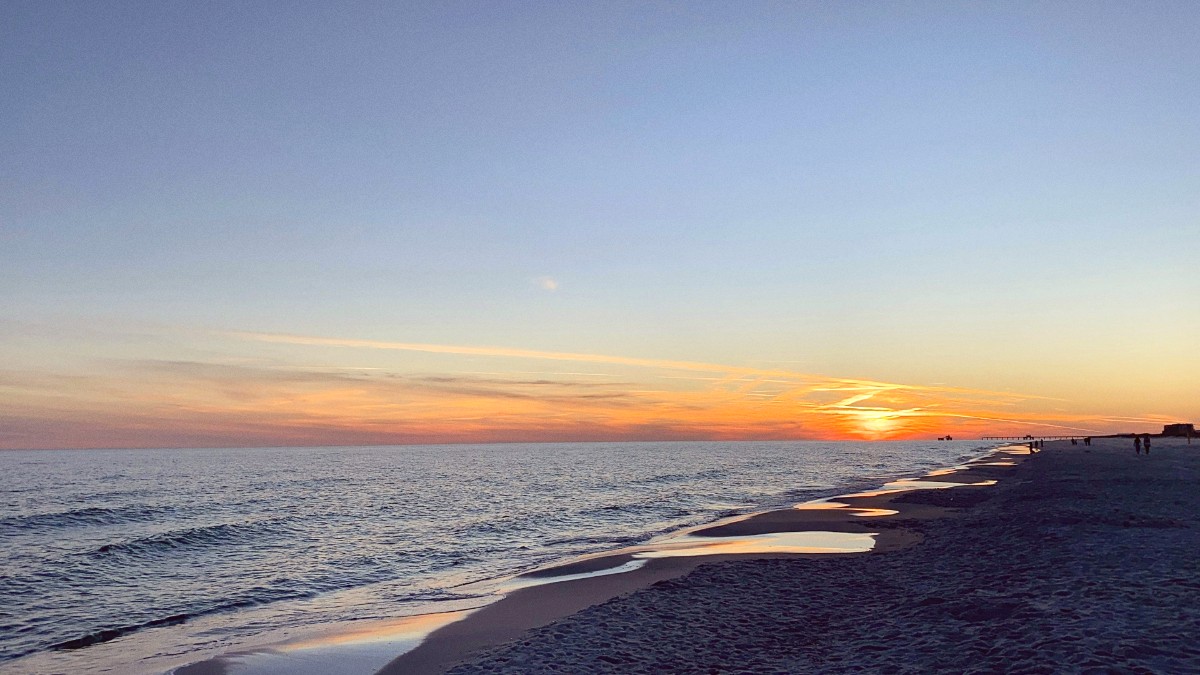
Alabama, USA
Spring (March-May): Temperatures generally range from 60°F to 80°F (15-27°C). The air feels comfortable, with moderate humidity and less frequent rain than summer. This period brings a pleasant environment for outdoor activities.
Summer (June-August): Expect hot and humid conditions. Daily high temperatures often go above 90°F (32°C). Afternoon thunderstorms occur regularly, bringing brief relief from the heat. The high humidity makes temperatures feel warmer.
High, Shoulder, and Low Seasons each bring different crowd levels and pricing, influencing your overall experience.
March-April (Spring Break/Easter) & June-August (Summer)
Water feels warm for swimming. All attractions and services operate at full capacity.
Accommodation and activity prices peak. Beaches and restaurants crowd. Summer brings peak humidity and heat. Late summer carries a tropical storm and hurricane risk.
May, September-October
Pleasant temperatures for most activities. Fewer crowds compared to peak season. Accommodation rates start to drop. Water remains warm enough for swimming in early fall. Good for outdoor activities like biking and hiking.
May can still feel hot and humid. September retains a higher hurricane risk.
November-February
Lowest prices for lodging. Minimal crowds. Mild temperatures make walking, biking, and golf comfortable. This period appeals to "snowbirds" seeking a warm winter escape.
Water is generally too cool for swimming for most visitors. Some seasonal attractions may close or operate with limited hours. Occasional chilly or rainy days happen.
This officially runs from June 1st to November 30th. Peak activity typically occurs from August through October. Travelers during this period should monitor weather forecasts closely and consider purchasing travel insurance that covers hurricane-related disruptions. Local authorities issue alerts and evacuation orders when storms approach.
Summer features heat advisories. Stay hydrated by drinking plenty of water, especially when outdoors. Seek shade during the hottest parts of the day, typically between 10 AM and 4 PM.
These powerful currents frequently occur along the Gulf Coast.
Beach safety flags provide information on current conditions. Green flag means low hazard, yellow means medium hazard, red means high hazard.
Double red flags indicate the water is closed to the public due to dangerous conditions.
Always observe flag warnings and swim near lifeguards when possible.
If caught in a rip current, swim parallel to the shore until you are out of the current, then swim to shore. Do not try to swim against the current.
Travelers visiting Gulf Shores, Alabama, need to meet specific identification or visa requirements depending on their nationality.
Identification: A valid government-issued photo ID, like a driver's license or state ID card, suffices for domestic air travel. As of May 7, 2025, a REAL ID-compliant driver's license or state ID card, or another acceptable form of identification, will become necessary for domestic flights.
International visitors to the United States generally need a visa, like a B-2 (tourist) visa, unless they qualify for visa-free entry under specific programs.
Visa application fees apply for non-VWP travelers. ESTA applications also incur a fee. These fees are non-refundable.
Costs vary significantly based on your travel style and the season.
The official currency in Gulf Shores, and throughout the United States, is the United States Dollar (USD or $). Major credit cards like Visa, MasterCard, American Express, and Discover are widely accepted at most establishments, including hotels, restaurants, and shops.
Automated Teller Machines (ATMs) are readily available at banks, grocery stores, and convenience stores for cash withdrawals. Be aware of potential transaction fees from both your bank and the ATM operator.
A traveler seeking cost-effective lodging and dining, focusing on free or low-cost activities like beach access and state parks.
Estimated Daily Cost: $110 - $265
Typical spending per day for lodging, food, and basic activities.
A traveler looking for comfortable accommodations, a mix of casual and nicer dining, and some paid attractions like mini-golf or pier fishing.
Estimated Daily Cost: $265 - $520
Includes mid-tier lodging and diverse dining choices.
A traveler seeking premium experiences, high-end accommodations, fine dining, and various private charters or exclusive attractions.
Estimated Daily Cost: $620 - $1800+
Covers upscale lodging, fine dining, and premier activities.
| Category | Low End | High End |
|---|---|---|
| Accommodations (per night) | $70 (Economy motel) | $1000+ (Upscale resort/large condo) |
| Meals (per person/day) | $30 (Grocery/takeout) | $250+ (Fine dining) |
| Attractions (per person/day) | $0 (Free beach) | $300+ (Deep-sea fishing) |
This information guides you through common concerns and preparations for your trip.
No specific vaccinations are required for travel to Gulf Shores. The CDC recommends ensuring your routine vaccinations are up-to-date.
Apply Broad-spectrum sunscreen (SPF 30+). Wear protective clothing, hats, and sunglasses. Seek shade during peak sun hours (10 AM - 4 PM).
Stay hydrated by drinking plenty of water, especially when active outdoors. Carry a Reusable water bottle.
Rip Current Safety: Observe beach safety flags. Swim parallel to shore if caught in a current.
Marine Life: Be aware of jellyfish, stingrays, and other marine life. Shuffle your feet when entering the water to deter stingrays. Avoid touching any marine animals.
Food Safety: Tap water is safe. Food hygiene standards in licensed restaurants are high. Practice good hand hygiene, notably before eating.
Allergies: Pollen counts can be high. Standard allergy medications are available.
Dial 911 for all emergencies (police, fire, ambulance).
South Baldwin Regional Medical Center (Foley) or Thomas Hospital (Fairhope) provide comprehensive care.
Several urgent care clinics in Gulf Shores and Orange Beach address non-life-threatening issues.
Gulf Shores is generally considered a safe tourist destination. Violent crime rates remain low.
Travel insurance is highly recommended, especially during hurricane season or with pre-existing medical conditions. A comprehensive policy covers unforeseen events like trip cancellation, medical emergencies, and lost luggage.
Trip cancellation or interruption, medical emergencies, emergency evacuation costs, lost/delayed/stolen luggage. (World Nomads, SafetyWing, Insubuy)
Local Emergency: Dial 911 (Police, Fire, EMS). Gulf Shores Police (Non-Emergency): +1 (251) 968-2431. Gulf Shores Fire (Non-Emergency): +1 (251) 968-7422.
For flight disruptions, check AirHelp for compensation details.